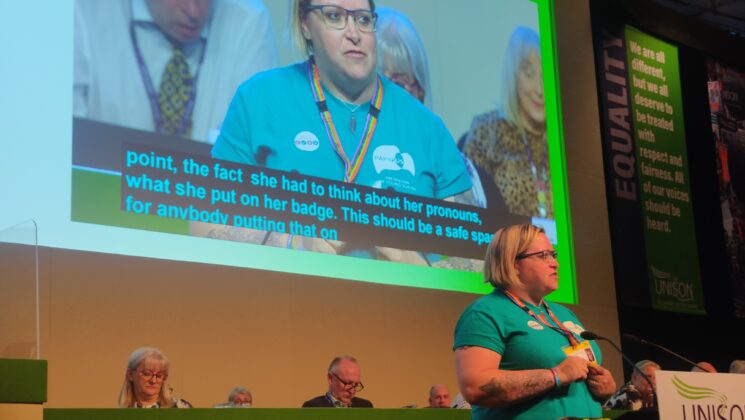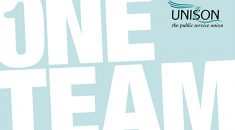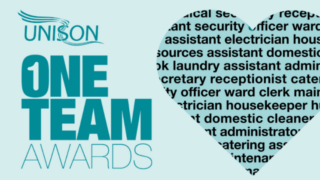A busy afternoon for health delegates debating in Liverpool yesterday saw them debate a number of motions covering equality issues.
Domestic violence
Motion 23, submitted by the national women’s committee, urged conference to address domestic violence as a workplace issue. The mover of the motion, Cheryl Perit, opened by telling delegates: “Too many women live in fear of violence.”
Ms Perit added: “Home and work issues cannot always be neatly separated. Violence can frequently spill over into the workplace.
“The best employers are introducing workplace policies on domestic abuse. And these policies make disclosing abuse less terrifying for the victim whilst also de-stigmatising it.
“That’s why we’re calling on the SGE to work with devolved nations to use the negotiating and partnership arrangements to renew and reinvigorate existing policies on employers’ support to staff who have experienced gender-based violence.”
Sarah Prosser, from West Belfast branch, emphasised that: “Laws on their own will not stop domestic abuse and violence, we need a massive cultural shift.”
She added: “During the pandemic the advice was to ‘stay home and stay safe’, but many women were not safe at home.”
Conference then heard an emotional, personal account of experiencing domestic abuse at 10 years old, from Jeff Pitman, of the East of England Ambulance Service. “I never understood domestic abuse when I was younger,” he said, adding that he only came to terms with the abuse and its effects many years later.
Sexual harassment in nursing
Motion 24 on the unacceptable sexual harassment culture in nursing was submitted by the nursing and midwifery occupational group, which called on the SGE to:
- Restate its opposition to sexual harassment of any kind, whoever the perpetrator is;
- Pressure employers to develop skills training packages for members who work in at risk areas;
- Support branches to campaign for safe and robust lone-working policies;
- Empower health and safety reps to work with managers and employers to ensure the safest possible environment around health workplaces.
Moving the motion, Gamu Nyasoro condemned the “sexualisation and irresponsible stereotyping of nurses by the media,” which led to nurses being branded as ‘handmaids’ or ‘naughty nurses’.
She cited the results of a Nursing Times survey conducted in 2020, which showed that 60% of nurses reported experiencing sexual harassment from colleagues, patients or the public in their workplace, and that three-quarters of nurses don’t feel safe when walking home after hours.
Wilma Brown of the health SGE asked: “Is it a coincidence that a field dominated by female workers still produces data that 61% have been harassed at work?
“Nurses want what we all want,” she added, “and that is an end to all harassment and bullying of women in our union.”
Racism and the impact of COVID on Black NHS staff
Motion 25, ‘We are one team against racism’ was submitted by the health SGE and asked conference to recognise that it is imperative UNISON is at the forefront of the movement to fight racism.
The mover, Maria Alberts, said: “Racism isn’t going to go away by itself, unless we fight for change. We need staff at all levels to feel and know they can come to work and be protected from racism. In a safe working environment, it should be everybody’s responsibility to fight racism.”
Annette Heslop of the national Black members’ committee said: “With the effect of decades of institutional and structural racism in the workplace, the time for action has never been more critical.” She highlighted the fact that 60% of Black members had not been offered a risk assessment over the pandemic.
Ms Heslop then moved motion 26, ‘Disproportionate impact of COVID on Black NHS staff’ for her committee.
“Racism is not only wrong, it is against the law, it wastes talent, damages staff, hurts patient and holds back the NHS,” she told delegates. “A culturally diverse workforce is good for the workplace. The NHS should strive to be an exemplar in terms of equality, diversity and inclusion.”
Gamu Nyasoro from the East Midlands continued the debate, telling conference of the human cost of the pandemic. “COVID touched all of us differently, but for me, in my community, I have lost many people,” she said.
“One of them was Veronica Price-Jobs. She shielded for the majority of the COVID pandemic. When we went back to work, her GP told her she couldn’t take the vaccine because of her illnesses. Her work didn’t listen to her and she had to go back.
“In her first week of going back to work she caught COVID, and she passed away because no-one listened to her.”
The motion called on the SGE to step up the public-facing aspect of the Race for Equality, identify structural and institutional systems which prevent Black workers from playing a full role in the NHS, and ensure that branches have access to support for members through the union’s race discrimination protocol.
The workplace disability equality standard (WDES)
Linda Woods from the national disabled members’ committee moved motion 27. It called on the SGE to work with the disabled members committee to develop a campaign identifying the key issues in the report and raising them with employers, as well as producing resources and materials highlighting the barriers faced by disabled workers.
She said: “Its hard to believe that the WDES has been around since 2019 when the action plans that have been produced have done so little for our disabled members.
“So yet again it falls upon us to continue to push hard on our disability agenda in our workplaces – but we need to push even harder.”
Equality and diversity training
The final motion on equalities noted the concern that, even before the pandemic, and as a result of the Tory government’s cuts, areas of best practice had fallen by the wayside, with equality and diversity being one of the early casualties.
Laura Heaton-Sutton (pictured above), from the LGBT+ committee, moved the motion, saying: “There’s now a real fear from LGBT workers that concerns are not being addressed, that homophobia, transphobia and biphobia are on the rise in the healthcare setting.
“With COVID, this training has been put on the back burner. That isn’t acceptable, it shouldn’t be happening. This training should be made a priority for all staff, and not just after something has gone wrong. What’s the point in shutting the door once the horse has bolted?”
Andy Chaffer, of the LGBT+ committee, questioned the efficacy of online tick-box exercises in place of face-to-face training, a point which Sophie Robinson, echoed, saying: “People are frightened to ask the question, ‘Is this right, can I say this?’ You’re not going to get that knowledge or understanding through a tick-box exercise – you only get it through talking to someone with lived experience.”







